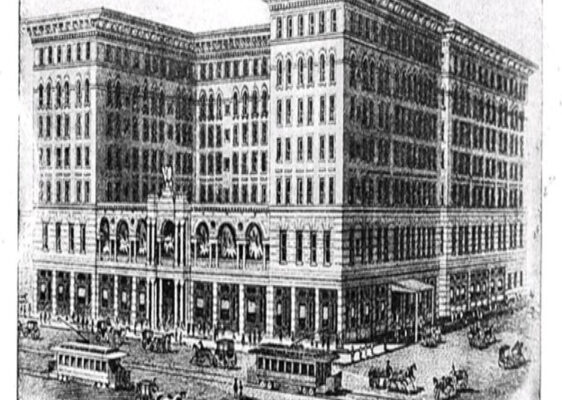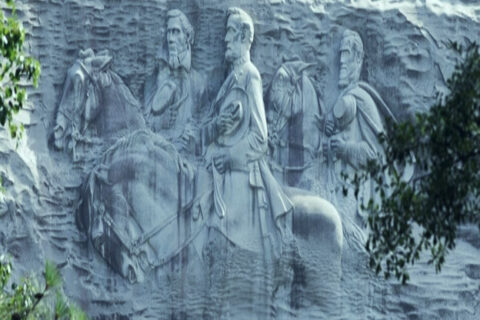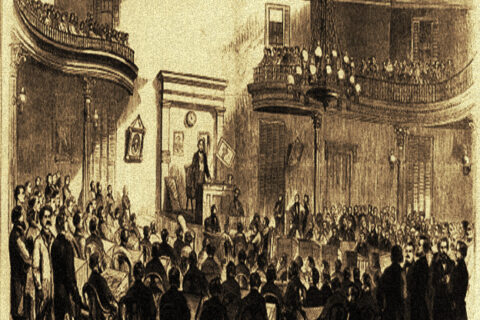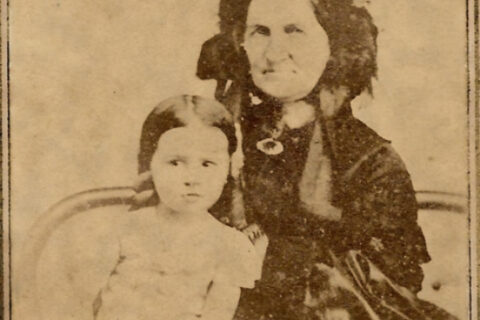(Note to readers: Parts I and II of Judge Rogers’s speech may be read here, and here. In part III of our series, we pick up where we left off reading in part II, with Judge Rogers further proving, by a preponderance of the evidence and beyond a reasonable doubt, that the right of individual States to secede from the union for cause had never been seriously questioned dating back to the celebrated Constitutional Convention and beyond, nor up to the years and months immediately predating outbreak of the so called “Civil War.” That the Constitution perpetually bound the States to a Satanic “Hotel California” scenario in which individual States may “check out any time [they] like, but can never leave,” was certainly a novel concept in 1861, in precisely the same sense that, several decades later, it was novel for the Supremes to discover “Incorporation” ingeniously hidden away in the language of the fourteenth amendment by the framers thereof; and that, moreover, it is and always has been a fundamental principle of “our democracy” and “original intent,” that Congress merely need “occupy a field and intend a complete ouster [of State and local authorities]” in order to legally usurp the doctrine of Article VI and the Ninth and Tenth Amendments respectively.
In this portion of his address, Judge Rogers also ably illustrates that the seeds of disunion were originally sewn in the “fertile soil” of fanatical New England radicalism; that these were further allowed to grow and produce their own kind of fruit in that environment by their own political and leadership class of mere politicians (as opposed to statesmen and patriots). In his excellent book, Origins of the Late War (c. 1866), George Lunt also speaks to this dearth of patriotic statesmanship in the New England States and their burnt over districts prior to the war, a relevant example of which I have added in a footnote to this post. All of the foregoing said, we give you Part III of “The South Vindicated,” by Judge John Henry Rogers. -TM):
“In 1811, in the debate of the bill for the admission of Louisiana into the Union, Josiah Quincy, a member of Congress from Massachusetts, said:
If this bill passes, it is my deliberate opinion that it is virtually dissolution of the Union; that it will free the States from moral obligation, and as it will be the right of all, so it will be the duty of some definitely to prepare for that separation, amicably if they can, violently if they must.
“Cabot, Quincy, and Pickering were strong Federalists, not “misguided advocates of State rights,” but friends of a strong, centralized, Federal government.
“All of us know of the Hartford Convention, held in 1814, growing out of the war with Great Britain, in which were representatives regularly elected by the Legislatures of Massachusetts, Rhode Island, and Connecticut, and representatives irregularly chosen from New Hampshire and Vermont. They sat with closed doors, but it is known that their object was the discussion of the expediency of those States withdrawing from the Union and setting up a separate Confederation. They determined upon its inexpediency then, but published to the world the conditions and circumstances under which its dissolution might become expedient.
“In the years 1844-45, when measures were taken for the annexation of Texas, the Legislature of Massachusetts passed a resolution [stating] that:
The Commonwealth of Massachusetts, faithful to the compact between the people of the United States, according to the plain meaning and intent in which it was understood by them, is sincerely anxious for its preservation; but that it is determined, as it doubts not the other States are, to submit to undelegated powers in no body of men on earth, and that the project for the annexation of Texas, unless arrested on the threshold, may tend to drive these States into a dissolution of the Union.
“In the convention which framed the Constitution itself the proposition was made and lost, giving authority to employ force against a delinquent State, but Mr. Madison said:
The use of force against a State would look more like a declaration of war than an infliction of punishment, and would probably be considered by the party attacked as a dissolution of all previous compacts by which it may have bound.
“Senator Henry Cabot Lodge, in his “Life of Webster,” says:
It was probably necessary – at all events Mr. Webster felt it to be so – to argue that the Constitution at the outset was not a compact between the States, but a national instrument, and to distinguish the cases of Virginia and Kentucky in 1799, and of New England in 1814, from that of South Carolina in 1830. Unfortunately, the facts were against him in both instances.
“When the Constitution was adopted by the votes of States at Philadelphia, and accepted by the votes of States in popular conventions, it is safe to say there was not a man in the country, from Washington and Hamilton on the one side to George Clinton and George Mason on the other, who regarded the system as anything but an experiment entered upon by the States, and from which each and every State had the right peaceably to withdraw, a right which was very likely to be exercised.
“Wendell Phillips, a lawyer, an author, and a statesman, in New Bedford, Mass., in 1861, said that the States who think their peculiar institutions require a separate government –
have a right to decide that question without appealing to you or me.
“A convention in Ohio in 1859 declared the Constitution a compact to which each State acceded as a State, and is an integral party, and that each State had the right to judge for itself of infractions, and of the mode and measure of redress, and to this declaration Giddings, Wade, Chase, and Denison assented.
“At Capon Springs, Va., June 28, 1851, Daniel Webster said:
I do not hesitate to say and repeat that if the Northern States refuse willfully and deliberately to carry into effect that part of the Constitution which respects the restoration of fugitive slaves, and Congress provide[s] no remedy, the South would no longer be bound to observe the compact. A bargain broken on one side is broken on all sides.
“Writing to a committee of New York lawyers in 1851, Mr. Webster said:
In the North, the purpose of overturning the government shows itself more clearly in resolutions agreed to in voluntary assemblies of individuals, denouncing the laws of the land, and declaring a fixed intent to disobey them. I notice that in one of these meetings, holden lately in the very heart of New England, and said to have been very numerously attended, the members unanimously resolved ‘That as God is our helper we will not suffer any person charged with being a fugitive from labor to be taken from among us, and to this resolve we pledge our lives, our fortunes, and our sacred honor.’
“He conjured his fellow citizens ‘to reject all such ideas as that disobedience to the laws is the path of patriotism, or treason to your country [is] duty to God.’
“I need not array further evidence as to where and when the seeds of disunion were first sown. The truth is, they antedate the Constitution, and the nursery and hotbed in which they were cared for and cultivated in the first fifty years of the republic was in the North, principally New England. The truth I believe is that, from the very beginning, a large majority of the South believed in the constitutional right of a State to secede and some believed in the doctrine of nullification as a remedy for flagrant violations of the Constitution; but they loved the Union, and, largely controlling its destinies for sixty out of seventy years, they held it steadily within its constitutional limits. They never nursed any doctrine looking to its destruction.
“In its early perils, when its enemies within and without threatened its existence, when at best it was an experiment, the South was found entangled in no hostile machinations. As in her revolutionary struggles the South sent to the army no Benedict Arnold, so in the weakness of her infancy she furnished no Shay’s rebellions nor Hartford conventions.
“Alexander Stephens has said, and it is worth remembering, that:
No Southern State ever did, intentionally or otherwise, fail to perform her obligation as to her confederates under the Constitution, according to the letter and spirit of its stipulated covenants, and they never asked of Congress any action or invoked its powers upon any subject which did not lie clearly within the provisions of the Articles of Union.
“I affirm, therefore, if odium is to attach to the South for the act of secession, it must also attach to the great North and East, where it was, for political, economical, and industrial reasons, sedulously agitated and inculcated up to the Mexican war, and the right distinctly recognized by its leading statesmen up to 1860. History ought to not allow them to slip this odium, if odium it be, from their shoulders to the shoulders of the South. It is true, South Carolina inaugurated nullification in 1830, a doctrine which was never generally accepted by the Southern statesmen, and which, to my mind, has always seemed illogical, if not unethical; a doctrine which, as I have always understood, President Davis never approved, and a doctrine which President Jackson unceremoniously stamped out; a doctrine, nevertheless, as we shall see, which permeated all the abolition States of the North.
“Our children should know that the Confederate States, by the act of secession, made no war on the United States; that the war between the States was not rebellion. It was the result of an effort by the United States to coerce States against their will to remain in the Union, a power not to be found in the Constitution, a power which all the earlier fathers believed did not exist, a power utterly inconsistent with the right of secession, which it is believed all parts of the country recognized when the Constitution was framed and for many years thereafter.
“If the Southern States had the power, notwithstanding the Constitution, to withdraw from the Union in 1803, in 1812 and in 1845, as New England statesmen then affirmed, they had the same power in 1861. No change of the Constitution had been made, and the relations of the States to each other were unaltered. If that power existed at all, the expediency of withdrawing was one solely for each State to decide for itself. The New York Tribune, the organ of the abolitionists of that day, said:
If the Cotton States wish to withdraw from the Union, they should be allowed to do so,” and that “any attempt to force them to remain would be contrary to the principles of the Declaration of Independence and to the fundamental ideas upon which human liberty is based,” and that “if the Declaration of Independence justified the secession from the British Empire of three millions of subjects in 1776, it was not seen why it would not justify the secession of five millions of Southerners from the Union in 1861.
“I make no apology for quoting a single paragraph from that instrument, the Declaration of Independence:
We hold these truths to be self-evident: that all men are created equal; that they are endowed by their Creator with certain inalienable rights; that among them are life, liberty, and the pursuit of happiness; that to secure these rights governments are instituted among men, deriving their just power from the consent of the governed; that whenever any form of government becomes destructive of these ends, it is the right of the people to alter or abolish it, and to institute a new government, laying its foundations on such principles and organizing its powers in such form as to them shall seem most likely to effect their safety and happiness.
“Assuming the power existed, I affirm that if at any time in all our history secession was ever justifiable it was in 1861. No less than fourteen Northern States had, by Legis- lative enactments, nullified the fugitive slave law; and what of this fugitive slave law? When the Constitution was framed slavery was lawful in all the States, and actually existed in nearly all. True, it had been forbidden by a congressional ordinance in the Northwest Territory, but that ordinance was accompanied by a proviso for the rendition of fugitive slaves, and this proviso, says Dr. Curry,
was the precursor of the fugitive slave clause, embedded the same year in the Constitution, without a dissenting voice.
“We all know, the world knows, that our independence could not have been achieved, our Union could not have been maintained, our Constitution could not have been established, without the adoption of those compromises which recognized its continued existence, and left it (slavery) to the responsibility of the States of which it was the grievous inheritance.
“Mr. Justice Story, in the Prigg case, said:
Historically, it is well known that the object of this clause was to secure to the slaveholding States the complete right and title of ownership in their slaves, as property, in every State of the Union into which they might escape from the State wherein they were held in servitude.
“But the truth demands that it should be stated that neither that ordinance nor the constitutional proviso referred to was the origin of the fugitive slave law. In 1643 Articles of Confederation were formed by the colonies of Massachusetts, Plymouth, Connecticut and New Haven for mutual help. The Articles provided that all servants running from their masters should, upon demand and proper evidence, be returned to their masters and to the colonies whence they had made their escape. This New England and Puri- tan fugitive slave law was the first enacted on this continent.
“This fugitive slave law, thus nullified by fourteen States, was an Act of Congress, passed in pursuance of the express mandate of the Constitution. The temper of the North at that time may be best illustrated by a few quotations.
“Mr. Seward said:
There is a higher law than the Constitution which regulates our authority over our domain. Slavery must be abolished, and we must do it.
“Others formulated their creed into this sentence:
The times demand and we must have an anti-slavery Constitution, an anti-slavery Bible, and an anti-slavery God.
“Mr. Edmund Quincy thus voiced the idea of his school:
For our part we have no particular desire to see the present law repealed or modified. What we preach is not repeal, not modification, but disobedience.
“A reverend and active abolition agitator said:
The citizen of a government tainted with slave institutions may combine with foreigners to put down the government. […]
[To be continued in Part IV]
“Actuated solely by the selfish hope of the spoils of office, this factious set of men devoted themselves to any cause of agitation that promised them the most abundant success at home. Utterly without principle themselves, they derided the idea of its influence over others. Not a few of them have subsequently been among the most active promoters of public commotion, and in the front ranks of the least dangerous places of the war. To suppose them impelled by any motives of philanthropy, or emotions of humanity, would be as impiously absurd as the deification of hypocrisy itself. Nothing is easier than to harangue against oppression and cruelty, and the “slave power” afforded them a ready and an ample theme.”
George Lunt, Origins of the Late War, 1866







Reading the conflicting statements of Daniel Webster, I’m reminded that a man’s word is not his bond for everyone.
Werner Sombart wrote in ‘A New Social Philosophy’ that “The fundamental attitude of men towards the things of this world is that between the trader-conception and the heroic-conception.” The heroic-minded will keep their word even if they’re disadvantaged by it.
On the other hand, the trader-spirit’s watchword may always be duty and principle; but “he never forgets”, (as George Bernard Shaw wrote in ‘Man of Destiny,’) “that the nation which allows its duty to get on the opposite side of his interests is lost.”
I wish they’d stop mind-controlling you goy to come here and say critical things about Jews.
Why do they do it? That’s a mystery only they know. Based on some ulterior purpose, I suppose.
You know what’s really creepy?
When someone else controls your face.